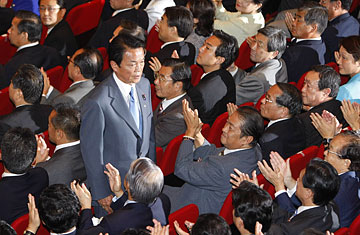
Former foreign minister Taro Aso bows to parliamentarians of the ruling Liberal Democratic Party (LDP) after being was chosen party president on Sept. 22
Japan's ruling party is betting on a little attitude going a long way. On Sept. 22, the Liberal Democratic Party gave itself a personality injection by electing Taro Aso, a Roman Catholic, "manga"-loving conservative with a wry smile and a sharp tongue, as its new president. The LDP must now wait to see if Aso's ascendance will be enough for the party to regain the five-decade legislative stranglehold it lost last year in the Diet.
Aso is expected to become the nation's next Prime Minister. On Sept. 24, during the Diet's new session, Prime Minister Yasuo Fukuda — whose administration suffers from chronically low approval ratings, economic woes and gridlock in the Diet — will hand over the reins of government. Aso's rise signals the LDP's intent to reinvigorate its image and ride A wave of public support, typical for new prime ministers, into the general election. If those elections are held in late October as expected, Aso, 68, and his new Cabinet will have roughly one month to convince voters that the party is paying attention to their needs while it addresses contentious issues such as the supplementary budget, which could include tax cuts for low income Japanese.
Media and political experts chide Aso, a former foreign minister, as too hawkish, gruff and outspoken. In the past, he put his foot in his mouth by saying that "even Alzheimer's patients" could tell that rice was more expensive in China, and in response to China's criticism of former Prime Minister Koizumi's visit to Tokyo's Yasukuni Shrine (considered by some to be a symbol of Japan's wartime aggression) he told China "to keep quiet". His political gaffes make headlines, make LDP members cringe and, in the past, have strained ties with China. But Aso's awareness of his shortcomings, his persistence — this is his third run for prime minister — and his pedigree stand out. Both his grandfather and father-in-law were prime ministers and Aso's sister married into the imperial family. Pegged to win since Fukuda announced his plans to resign three weeks ago, he has the support of the LDP's partner coalition, the New Komeito Party, as well as younger voters. After campaigning for nearly two weeks, he easily beat the other four LDP candidates, including Yuriko Koike, the party's first female presidential candidate, who was backed by former Prime Minister Junichiro Koizumi.
But even with a new face as prime minister, Japan's old problems remain. Aso says he will focus on the country's fragile economy — Japan's budget deficit totals about 170% of GDP, by far the highest among developed economies. Meanwhile, the country's growth is threatened by a global slowdown and slipped into negative territory from April to June 2008. At a press conference on Friday, Aso said that he's proud of the fact that the Japanese economy is relatively sound and that Japan didn't participate in the "money game" that led to the troubles now faced in the U.S. But, he says, that if these economic problems are systemic then "the world should come together to overcome it."
Regardless of his economic policies, political observers say LDP members had little choice to elect him party President. "I think that he gets the LDP support because he's maybe the only one of the whole party who can fight the election campaign with a little chance of winning," says Axel Klein, a political scientist based in Tokyo. "There is no one else around."
(See examples of Japanese design here.)
